Mr. Bush goes to Ottawa
Dec 2nd, 2004 | By Counterweights Editors | Category: Ottawa Scene Belinda Stronach, the new and still cute Canadian Conservative MP from Magna International (who has also had lunch with Bill Clinton, or some such thing)Â may have made the most sensible point about George W. Bush’s low-key official visit to Canada, November 30/December 1, 2004. It was not so much a first act of the second Bush-Cheney administration in Washington, as a last act of the first one, whose cabinet members are now so rapidly resigning.
Belinda Stronach, the new and still cute Canadian Conservative MP from Magna International (who has also had lunch with Bill Clinton, or some such thing)Â may have made the most sensible point about George W. Bush’s low-key official visit to Canada, November 30/December 1, 2004. It was not so much a first act of the second Bush-Cheney administration in Washington, as a last act of the first one, whose cabinet members are now so rapidly resigning.
With such new and old luminaries as Condoleeza Rice and Colin Powell along for the ride, the visit did seem meant to show Canadians, and any others who might be vaguely interested, that the George W. Bush who is re-grouping for 2005 and beyond has warmer feelings about Canada than he did in 2001.
 Then Mexico, not Canada, was the first North American priority for the new regime in Washington. The original Bush-Cheney team spoke with the rising voice of the more rapidly growing regions of the late 20th century USA, in the South and the Southwest. It had left the old American establishment of the rusting Northeast behind. It had even less patience with the surviving liberal counter-culture in the Pacific Northwest. The hot new concern was the southern border with Mexico. The old undefended northern border with Canada was a thing of the past.
Then Mexico, not Canada, was the first North American priority for the new regime in Washington. The original Bush-Cheney team spoke with the rising voice of the more rapidly growing regions of the late 20th century USA, in the South and the Southwest. It had left the old American establishment of the rusting Northeast behind. It had even less patience with the surviving liberal counter-culture in the Pacific Northwest. The hot new concern was the southern border with Mexico. The old undefended northern border with Canada was a thing of the past.
In late 2004 Canada itself has changed since 2001. Then its Liberal prime minister was a distinctly French Canadian from Quebec, who was also a golfing buddy of Bill Clinton’s (and had appeared briefly in some parallel role on a US TV special about Christmas at the Clinton White House). And the Canadian right was divided into at least two competing political parties.
 Now Canada’s Liberal prime minister is an only vaguely French Canadian from Ontario (originally) – who can also easily pass for an old-style Anglo-American, and has made friendlier official noises towards the USA (while retaining his predecessor’s distinctive Canadian foreign policy of not putting troops on the ground in Iraq). The Canadian right is united again.
Now Canada’s Liberal prime minister is an only vaguely French Canadian from Ontario (originally) – who can also easily pass for an old-style Anglo-American, and has made friendlier official noises towards the USA (while retaining his predecessor’s distinctive Canadian foreign policy of not putting troops on the ground in Iraq). The Canadian right is united again.
For other somewhat wider reasons as well, Canada’s relative weight in Bush-Cheney strategic calculations has increased at least slightly since 2001. (As Mexico’s has fallen, among still other things – including, no doubt, the “massive shift in economic power” towards China, announced in the December 6, 2004 issue of the venerable New York magazine, Business Week). At the joint Bush-Martin press conference after their Ottawa meeting on November 30, the president did seem to be going out of his way to underline his warm feelings for his fellow North Americans in Canada – and even perhaps a certain fresh willingness to accept that Canada is some kind of independent country, even with its historic strong family ties to the USA. (The United States is not Russia after all, and Canada is not the Ukraine.)
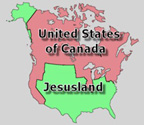 Yet it apparently remains equally true that, for George W. Bush, Canada is still, at the bottom of everything, just a geographically awkward too-true-blue state in the most northern part of his own North America. At the November 30 press conference in Ottawa he appeared somewhat chastened by lingering memories of his ordeals in the 2004 presidential debates. But he was certainly still ultimately inspired by his convincing enough victory in the only poll that really counted, on November 2. The American people had spoken, and they had, all quite legally and constitutionally, spoken with a clear 51% majority for him. That was what finally mattered.
Yet it apparently remains equally true that, for George W. Bush, Canada is still, at the bottom of everything, just a geographically awkward too-true-blue state in the most northern part of his own North America. At the November 30 press conference in Ottawa he appeared somewhat chastened by lingering memories of his ordeals in the 2004 presidential debates. But he was certainly still ultimately inspired by his convincing enough victory in the only poll that really counted, on November 2. The American people had spoken, and they had, all quite legally and constitutionally, spoken with a clear 51% majority for him. That was what finally mattered.
So he simply had to put troops on the ground in Iraq, to guarantee the domestic security of the United States, which has to be his highest value and priority. He’s a man who does what he says, and says what he does, and if he has to do it again he will. He very much understands that there are people who don’t like this – in his own country as well as in Canada. But that is their problem. Meanwhile, let’s face it, we are all still friends and even family all the same. He appreciates what Canada has done to help out, as it certainly has, in Afghanistan, which has already held a major world-historic democratic election, and elsewhere: Haiti, e.g.
 He doesn’t of course have the time to pay attention to any Canadian polls (and remember, he did win the poll that really counted in his own country on November 2). But he did feel that some people of Canada greeted him quite warmly as he rode from the airport to downtown Ottawa. They were waving – and with “all five fingers.” (And then he gave the slightly nervous but friendly and gregarious fraternity-brother laugh, which makes him such a hit with talk-show hosts and stand-up comedians in his own country.)
He doesn’t of course have the time to pay attention to any Canadian polls (and remember, he did win the poll that really counted in his own country on November 2). But he did feel that some people of Canada greeted him quite warmly as he rode from the airport to downtown Ottawa. They were waving – and with “all five fingers.” (And then he gave the slightly nervous but friendly and gregarious fraternity-brother laugh, which makes him such a hit with talk-show hosts and stand-up comedians in his own country.)
So some things have still changed forever since September 11, 2001 – but not all that much. The old undefended border is definitely a thing of the past. Canadians themselves have reasonable concerns about dubious people whom too-relaxed and too-few US border officials might allow into Canada. But the US-Canada border is still a pretty friendly place, dedicated, as all on both sides agree it must be, to keeping the wheels of North American commerce humming, above all else. It is no longer exactly “undefended,” the way it used to be. But it remains, the president stressed, at least “the unfortified border.” (And just which brilliant aide, one wonders, thought of that revolutionary new language? Is David Frum working in Washington again?)
 The Canadian press corps present asked a question about whether plans to decriminalize marijuana in Canada would have an impact on border issues. And George W.’s first response could almost be read as vaguely encouraging. He said he thought it would have more impact on the people who use marijuana (again with an only slightly nervous chuckle, and in a way that made you think he has probably used marijuana somewhat in the past himself, at least as much as Bill Clinton ever did). Then when pressed on the matter, a short while later, he just wisely said that he wasn’t going to make any comment about an internal Canadian issue like that.
The Canadian press corps present asked a question about whether plans to decriminalize marijuana in Canada would have an impact on border issues. And George W.’s first response could almost be read as vaguely encouraging. He said he thought it would have more impact on the people who use marijuana (again with an only slightly nervous chuckle, and in a way that made you think he has probably used marijuana somewhat in the past himself, at least as much as Bill Clinton ever did). Then when pressed on the matter, a short while later, he just wisely said that he wasn’t going to make any comment about an internal Canadian issue like that.
It was pretty much more of the same the next day in Halifax – where the president at long last offered a formal thank you from the Government of the United States to the people of Atlantic Canada, for their generous and friendly hospitality, far above and beyond the mere call of family duty, to quite large numbers of diverted US air travelers on September 11, 2001.
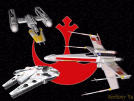 On the morning of December 1, 2004 some factions of the Canadian press were already expressing alarm that George W. Bush had unexpectedly voiced some sales talk about Canadian participation in continental ballistic missile defence (i.e., Son of Star Wars, or whatever it is). Someone in official Ottawa had apparently indicated that it would be best to avoid this subject in public, or something like that, because it was so delicately controversial in Canada’s present minority parliament. But there was still more of this sales talk in Halifax.
On the morning of December 1, 2004 some factions of the Canadian press were already expressing alarm that George W. Bush had unexpectedly voiced some sales talk about Canadian participation in continental ballistic missile defence (i.e., Son of Star Wars, or whatever it is). Someone in official Ottawa had apparently indicated that it would be best to avoid this subject in public, or something like that, because it was so delicately controversial in Canada’s present minority parliament. But there was still more of this sales talk in Halifax.
Yet the other Canadian view, which the Martin government does seem to endorse itself, is that it’s just a no-brainer for Canada to go along with the Bush-Cheney team on this particular imprudent expenditure of appalling numbers of US taxpayer dollars. It’s going to happen anyway, and Canada has little to lose by being formally involved, and perhaps something to gain. As even Gwynne Dyer explained on CBC TV, if you’re not going to put troops on the ground in Iraq, you do have to give some ground on something else. From the standpoint of Canada’s continuing future as an independent country, this is an easy and perhaps strategic place to do it.
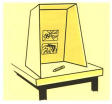 George W. Bush did seem to enjoy alluding to the logic of this position himself, perhaps as a sign that he truly is a man who says what he thinks regardless, etc. But this was finally not much more than a charade. At least a great many interested Canadians already appreciate that those in their country who seriously do want to oppose the Son of Star Wars, as a quixotic noble gesture in the wider North American internal family struggle for better public policy, are not going to win any elections for anybody, even in Canada.
George W. Bush did seem to enjoy alluding to the logic of this position himself, perhaps as a sign that he truly is a man who says what he thinks regardless, etc. But this was finally not much more than a charade. At least a great many interested Canadians already appreciate that those in their country who seriously do want to oppose the Son of Star Wars, as a quixotic noble gesture in the wider North American internal family struggle for better public policy, are not going to win any elections for anybody, even in Canada.
The one vaguely innovative thing about the younger President Bush’s December 1 speech on the Halifax waterfront was that he several times alluded to the concept of “multilateralism,” in what could be taken as an at least fresh-sounding way. Yet in the end this just seemed another case of the same old wine in new bottles at best. At bottom, the president’s Halifax speech was just a spirited defence of the US foreign policy he has been following ever since 9/11.
 What he actually seems to mean by multilateralism is pretty much the same old coalition of the willing as before – i.e. all those sovereign countries of the global village that are prepared to simply follow Washington’s lead in foreign policy, no questions asked. It is not, as Jane Fonda’s onetime husband Ted Turner once memorably said about how he ran his business, “be a leader or a follower or get out of the way.” It is just “be a follower or get out of the way.”
What he actually seems to mean by multilateralism is pretty much the same old coalition of the willing as before – i.e. all those sovereign countries of the global village that are prepared to simply follow Washington’s lead in foreign policy, no questions asked. It is not, as Jane Fonda’s onetime husband Ted Turner once memorably said about how he ran his business, “be a leader or a follower or get out of the way.” It is just “be a follower or get out of the way.”
If all this really was supposed to be some testing of the waters for a new approach to such more weighty dissenting allies as France and Germany, the key point would seem to be that the approach is not really all that new. The rhetorical language in which the policy is couched is more friendly, and even perhaps more genuinely understanding and sympathetic towards others’ concerns. But in the end George W. Bush is the same stand-up guy, and it’s the same old policy – as endorsed by the people of the United States on November 2, 2004.
 Nothing perhaps brought this home more for Canadians than the president’s attitude on the highly parochial but important issue of reopening the US border to exports of Canadian beef. This is one of two key current economic issues (softwood lumber exports are the other) that give the independent far northern brothers and sisters in Canada some firsthand taste of the kinds of US government policies that often create great irritation in other parts of the world.
Nothing perhaps brought this home more for Canadians than the president’s attitude on the highly parochial but important issue of reopening the US border to exports of Canadian beef. This is one of two key current economic issues (softwood lumber exports are the other) that give the independent far northern brothers and sisters in Canada some firsthand taste of the kinds of US government policies that often create great irritation in other parts of the world.
As a result of one mad cow reported in Alberta so long ago now that almost no one can remember just when (by a Canadian regulatory regime that, as Canadians see it, is considerably more stringent than the one imposed inside the US by Washington), the US has closed its border to Canadian beef. Because the North American cattle business is now so integrated, this has caused great havoc and financial loss in the Canadian cattle business – and proved something of a boon to the US cattle business, now inadvertently shielded from some of its usual competition.
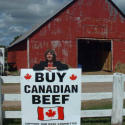 In his remarks to the Canadian people on this subject, George W. Bush was concerned to make clear that, as a sometime cattle rancher from Texas himself, he certainly did understand the cattle business in North America. And he appreciated that the closed border was causing great stress and even financial hardship for Canadian cattle ranchers. And he sympathized with the great frustration that Prime Minister Paul Martin had certainly expressed to him on this issue.
In his remarks to the Canadian people on this subject, George W. Bush was concerned to make clear that, as a sometime cattle rancher from Texas himself, he certainly did understand the cattle business in North America. And he appreciated that the closed border was causing great stress and even financial hardship for Canadian cattle ranchers. And he sympathized with the great frustration that Prime Minister Paul Martin had certainly expressed to him on this issue.
But Canadians just had to understand that there was really nothing the man who holds the most powerful political office in the world today can do about all this. US law and the federal bureaucracy in Washington are just lamentably slow in dealing with such matters (partly of course because this just keeps the resulting un-level playing field in favour of the US domestic cattle business intact a little longer, though of course the president did not mention this). US law and, in this case at least, the federal bureaucracy in Washington must be respected in such matters. It will still be a while yet before the unfortified border will be open to Canadian beef – but maybe as early as summer 2005, say.
 Meanwhile, almost as the president was speaking, Hong Kong, “a gateway to the Chinese market … announced … that it would open its border to certain cuts of boneless Canadian beef from cattle under 30 months of age.” Whatever else, it was no doubt hard for many Canadian residents not to feel that if George W. Bush had really wanted to show how he now has fresh and warmer feelings for Canada than he had in 2001, he could and would have made some similar announcement in Ottawa on November 30, or even in Halifax on December 1. But he did not, and, from the most practical Canadian standpoint, that was the long and short of it all in the end.
Meanwhile, almost as the president was speaking, Hong Kong, “a gateway to the Chinese market … announced … that it would open its border to certain cuts of boneless Canadian beef from cattle under 30 months of age.” Whatever else, it was no doubt hard for many Canadian residents not to feel that if George W. Bush had really wanted to show how he now has fresh and warmer feelings for Canada than he had in 2001, he could and would have made some similar announcement in Ottawa on November 30, or even in Halifax on December 1. But he did not, and, from the most practical Canadian standpoint, that was the long and short of it all in the end.
Of course, it may have been that Paul Martin’s government, in the intergovernmental runup to all this, was just not forthcoming enough on offering serious and practical help with the imminently scheduled world-historic democratic election in Iraq. Some neo-conservative Canadians even said similar things about Jean Chretien, back in the days when President Bush pointedly omitted Canada (including the Atlantic Canada that was so hospitable to stranded US air travelers) from the list of countries he thanked for help, in the immediate wake of 9/11, way back in 2001.
 It is also certainly true that George W. Bush is right about the family feeling that always exists between most Canadians and most Americans, regardless of what their respective governments do to each other, or to or for the people who elect them. Mr. and Mrs. Bush can be quite charming North American people. There was indeed much continental family warmth expressed towards the visiting team from Washington, by many different Canadians. The democratic protesters on the Ottawa and Halifax streets were for the most part polite and well behaved. Prime Minister Martin clearly does get along rather better with President Bush than Jean Chretien (whom the president apparently studiously ignored at the official Ottawa dinner on November 30).
It is also certainly true that George W. Bush is right about the family feeling that always exists between most Canadians and most Americans, regardless of what their respective governments do to each other, or to or for the people who elect them. Mr. and Mrs. Bush can be quite charming North American people. There was indeed much continental family warmth expressed towards the visiting team from Washington, by many different Canadians. The democratic protesters on the Ottawa and Halifax streets were for the most part polite and well behaved. Prime Minister Martin clearly does get along rather better with President Bush than Jean Chretien (whom the president apparently studiously ignored at the official Ottawa dinner on November 30).
But the final truth just might be that David Letterman is right: the real key to George W. Bush is that he was a cheerleader at Yale – boola, boola, and all that. Especially after his November 2004 election victory, one probably does have to concede that he can be a good cheerleader, and can sometimes deliver an even somewhat moving speech. Yet the biggest problem for the global village at the moment is still that he only knows how to cheer for one team. And it is still hard to see how even a properly elected American president of this sort can finally expect to play much of a serious role in helping to resolve the deeply challenging difficulties that certainly do haunt the international community, in the increasingly multilateral world of the early 21st century.
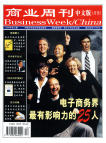 In any case, it’s all over now. Canadians can go back to reading about the “massive shift in economic power” towards China, in the latest issue of Business Week from New York. (And, as already reported on US TV, in Manhattan – still the closest the world today does get to a global financial capital – more than 80% of the American people voted for John Kerry.)
In any case, it’s all over now. Canadians can go back to reading about the “massive shift in economic power” towards China, in the latest issue of Business Week from New York. (And, as already reported on US TV, in Manhattan – still the closest the world today does get to a global financial capital – more than 80% of the American people voted for John Kerry.)

